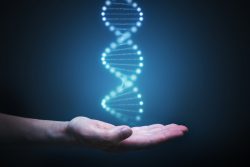 Scientists have made a groundbreaking discovery about the mechanisms of healthy development in embryos, which could change our understanding on what we inherit from parents and how they shape us. The new research suggests that mothers may be passing on more of their DNA than we thought, with an epigenetic legacy for future generations.
Scientists have made a groundbreaking discovery about the mechanisms of healthy development in embryos, which could change our understanding on what we inherit from parents and how they shape us. The new research suggests that mothers may be passing on more of their DNA than we thought, with an epigenetic legacy for future generations.
It’s a recently discovered phenomenon called “epi-genetics”. The study, led by researchers from WEHI in Melbourne, Australia has significantly broadened our understanding of which genes have information passed down through generations and what proteins control this unusual process.
We all know that our genetics determine who we are, but what if there were other factors involved? DNA contains the instructions for producing all cells in your body. It’s really hard to change yourself and pass on these new changes because they happen through alterations of chromatin structure around genes which cause them not to be read by protein-coding regions any longer – so no products get made! This means you can have different versions or “epigenes” depending how much nutrition improves during development.
And it turns out that mothers can pass on their genes through epigenetics to a tiny extent. This means we need more research into how this works and what other factors come in play when determining whether or not an individual will have certain traits based off the DNA they’ve been given at birth. The new research has shown that a mother’s supply of protein can affect the genes which drive skeletal patterning in their offspring.
The discovery that mother’s DNA contains information passed on through generations has a deep impact on how we view ourselves. With this new understanding, there are many more questions than answers about what other types of environmental factors can affect our development and future health risks.
Researchers have recently discovered a new link between the mother’s eggs and her developing baby. This study focused on one protein, SMCHD1; it was found by Professor Blewitt back in 2008! The researchers wanted to see what would happen if they decreased or increased this level within an ovo- fertilized embryo before birth via maternal transfer. They monitored how many different types of Hox genes were activated throughout development as well because these play important roles during patterning for elegant structural formation.
It has been shown that mothers pass on their epigenetic information, rather than just the blueprint of genes. This is fascinating knowledge that we can now put to use. While there are more than 20,000 genes in our genome-the average human possesses around 150 of these coding regions which carry genetic information produced by mutation or choice over time. “This is the first time that we’ve seen this type of inheritance happen in human beings,” said Dr. Benetti, “and it gives us an idea about how few genes really matter over long periods.”
Research has shown that a gene called SMCHD1, which only exists in the fertilized egg after two days of conception and is unique to humans as well as other animals, can have an impact on life-long health problems. This discovery could help women with these variants live more comfortable lives by providing them opportunities for treatment options through our drug design efforts at WEHI.
To view the original scientific study click below:
Maternal SMCHD1 regulates Hox gene expression and patterning in the mouse embryo





